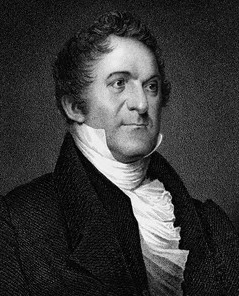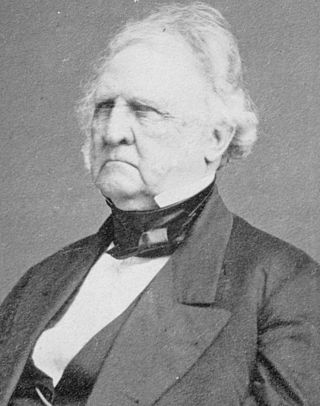
#8.) Andrew Jackson - Whig
(1829-1832)
(1829-1832)
Vice-President: William Wirt, Whig (1829-1832)
With emancipation to be achieved, the Federalist Party hit a bit of a slump. The businessmen and New Englanders who supported the party since inception stuck around, but the "Free Soil" and "Free Labor" activists began to gravitate away from the party, seeing the moral and economic threat of slavery defeated. The more radical abolitionists, like Federalist Congressman Birney, demanded equal rights for the Negro, while those affiliated with Workingmen societies pushed for Negro exclusion in the territories, and for a general deportation to Africa for a lily-white society.
With the still popular Adams refusing a third term, seeing no need to break the Washington precedent, the Federalist caucus started to creak. Normally the Vice-President would be assured the Presidential nomination. Under normal circumstances Clay would have been assured the nomination in 1828, several issues blocked him. First, his long history of slaveowner ship. While he emancipated all of his slaves at the beginning of the decade, and indeed started his career arguing in the Kentucky Legislature to pass an emancipation law, many Northern Federalists still distrusted him for not only that, but his congressional coup of Stockton in 1824 soured a lot of the New Jerseyans supporters. Despite winning a close ballot over Pennsylvania Representative Buchanan, Clay looked rather weak going in.
Meanwhile Andrew Jackson was able to easily collect enough votes from the Whig Caucus to get the nomination. Despite being rather ill from various wounds and ailments over the years, Jackson was able to portray himself as a strong virile man who would fight for the average man. Contrary to political norms of the day, Jackson's men went directly after men not of high standing and good breeding to advocate their position. They were able to not only sweep the South, were the electoral votes mainly came from the state legislatures, but many of the Northern states where the electoral votes came from the popular vote. The House also flipped to the Whigs for the first time due to above normal voting.
Jackson's main platform consisted of three things. Strip away the powers and influence the Bank of the United States held, cut the standing army down by two-thirds, and organize the remaining unorganized Lousiana territory. Some congressmen also wanted to extend the Lousiana territory either by purchase of Mexican lands, or conquest of Oregan (legally neutral until 1830, as signed by north America and Britain). Jackson managed to organize Michigan and Wisconsin into two separate territories, push through Arkansaw as a state, and establish Dakota and Iowa territories. Efforts to convince Cuba to join America went no where, as their youthful President Juan Manuel Cajigal y Odoardo refused to submit his nations independence.
Unfortunately, Jackson was sick for most of his remaining year in office, stalling much of his plans to cut the standing army and reform the bank. October 11, 1832 he died after a fit of pneumonia. Vice-President Wirt became the first Acting-President of the United States. Jackson is remembered mostly by historians for his stand against the extreme pro-slavery faction of the Whigs and for forging compromise measures in the General Emancipation Act. His Presidency is noted as above average but nothing spectacular. Although some praise him for attempting an early campaign toward the urban working class, other's discredit him as a privileged slaveholder who managed a better propaganda campaign then the Federalists could.

#A.) William Wirt - Whig
(1832-1833)
(1832-1833)
Vice-President: Himself (1832-1833)
Much confusion existed over what the position of Vice-President is while the President is incapable of holding office. Eventually Wirt went forth and declared himself still the Vice-President, and acting as President only when needed. Such as a cabinet office opening up, or an Ambassadorship needing to be filled, or legislation that needed to be signed. While this was generally accepted at first, no one realized how Wirt managed a particular subtle self-coup. He could not only retain the power of Senate President, allowing him direct control over the the upper house, but he would be able to then use that legislation as President.
His short term as Acting-President had him not only finish Jackson's plan of cutting the army, but arranging a biennial audit on the Bank by Congress. While not the meat cleaver that many Whigs wanted to take to the Bank, it was an effective way to limit the amount of money and power the Bank had over many Federalists and even some Whigs. As President of the United States and Senate, Wirt easily managed to convince his party to give him a shot as a real Presidency. Henry Clay meanwhile failed in his endeavors for a second nomination and John Quincy Adams protege Daniel Webster secured it instead.
#9.) William Wirt - Whig
(1833-1837)
(1833-1837)
Vice-President: Thomas Hart Benton, Whig (1833-1837)
Wirt's first real term had him continue the Whig policy of weakening the national government, and encouraging state and territorial power. Diplomatic overturns were made toward Mexico, with the intend of purchasing much of the unsettled Northern lands. While denied at first, brewing discontent over the policies of Emperor Agustín de Iturbide lead Wirt to retreat and try again later, possibly after a change in government. A provisional government, settled mostly by Americans, was set up in Oregon, something that caused many in Canada to worry over how far American lands would extend.
Despite worries that it could cause war with Britain, Wirt went ahead and authorized a conquest of the whole of Oregon Country. Federalists virulently protested this as unwarranted aggression toward Britain and of hypocrisy, Wirt using the military to conquer lands while himself working to gut it. Wirt partisans countered that before there was no need for a large standing military, many of them secretly believing it would be used in a Civil War to attack the South, but now there was. Wirt partisans also attacked the Federalists of surrendering what was rightfully American to the British for the sake of their own wallets.
Attempts by Britain to split the territories were ignored by the Wirt Administration, and eventually the British accepted the occupation of Oregon as fait accompli, and declined to pressure the Americans any longer. American's hailed Wirt as a hero for expanding the national borders, standing up to Great Britain, and pursuing the interests of the all Americans rather then just a privileged few in his attacks on the bank. Ill health near the end of his term convinced him to step aside from a second full term, which was a wise choice as he died only 17 days after the inauguration of his successor.
Wirt is looked upon as a rather skilled and impressive President. Hailed for establishing the role of succession, expanding national borders, and paying off the debt, he is seen as one of the better Presidents of the Second Party Era, with only Adams surpassing him.







